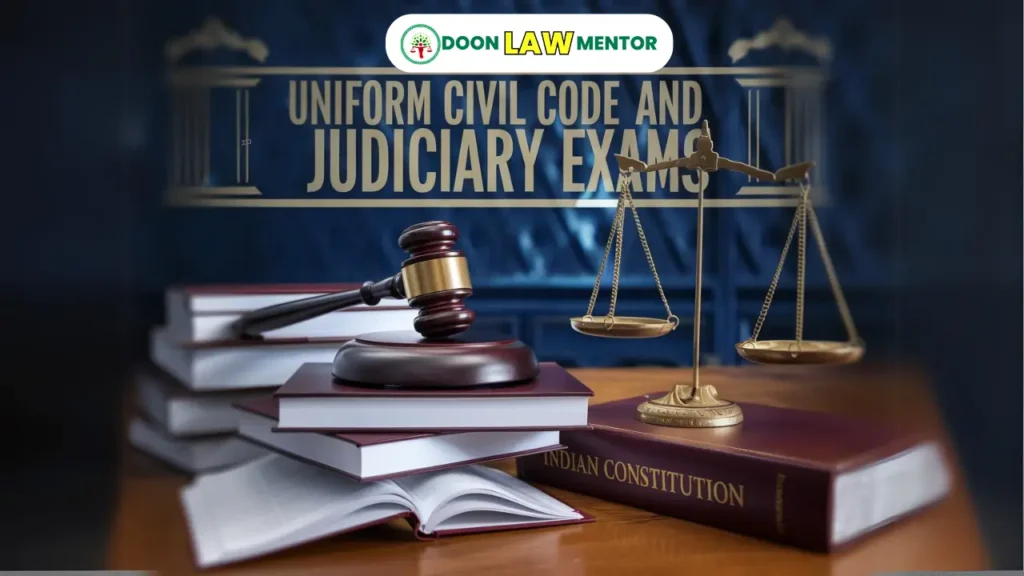The Uniform Civil Code could redefine personal laws and judiciary exams alike. This comprehensive guide explores its potential impact on exam preparation, highlighting essential topics and strategies to ace related questions.
Table of Contents
The Uniform Civil Code (UCC) has been a contentious yet crucial topic in India’s legal and political discourse. Its potential implementation raises significant implications for India’s judicial system, society, and especially for aspiring judiciary officers. This article explores the UCC, its core principles, and how it might shape the future of judiciary exams, ensuring you are well-prepared for this vital subject.
What is the Uniform Civil Code (UCC)?
The Uniform Civil Code proposes a single set of personal laws for all citizens, irrespective of religion, gender, or community. It aims to replace the existing personal laws, which are rooted in religious customs and traditions, with a common civil code governing matters like marriage, divorce, inheritance, adoption, and maintenance.
Constitutional Basis of the UCC
- Article 44: The Directive Principles of State Policy in the Indian Constitution advocate for the implementation of the UCC to ensure uniformity in civil laws across the country.
- Judiciary’s Role: The courts have often emphasized the need for a UCC to uphold constitutional values such as equality and secularism.
Historical Context of the UCC
- Colonial Era: British rulers refrained from interfering in personal laws, leading to the codification of separate laws for Hindus and Muslims.
- Post-Independence Debates: The Constituent Assembly debated the necessity of a UCC, but it remained a directive principle due to political and societal sensitivities.
- Judicial Intervention: Landmark cases like Shah Bano (1985) and Sarla Mudgal (1995) brought the UCC back into public and judicial focus, advocating for gender equality and legal uniformity.
Key Features of the Uniform Civil Code
- Uniformity in Laws: A single set of civil laws applicable to all citizens, ensuring equality.
- Gender Equality: The UCC seeks to remove discriminatory practices in personal laws that disadvantage women.
- Secularism in Action: By detaching civil laws from religious influences, the UCC embodies the secular ethos of the Constitution.
- Simplification of Judicial Processes: Common laws reduce the complexity and inconsistency of current personal laws.
Current Status of the UCC in India
The UCC is currently under discussion at various levels, with certain states and political groups advocating for its implementation. The Law Commission has engaged stakeholders to gather diverse perspectives, making the UCC a topic of active legal evolution.
Why Judiciary Aspirants Must Understand the UCC
- Relevance in Exam Syllabi: Judiciary exams often feature questions on constitutional law, family law, and recent legal developments, making the UCC a likely topic.
- Contemporary Importance: With its frequent presence in political and judicial discourse, the UCC is a high-priority area for competitive exams.
- Analytical Thinking: Preparing for UCC-related questions helps aspirants develop skills in legal analysis, critical thinking, and balanced argumentation.
Potential Questions on the UCC in Judiciary Exams
- Discuss the constitutional mandate of the UCC under Article 44.
- Analyze the impact of the UCC on personal laws in India.
- Critically evaluate the judicial stance on the UCC in cases like Shah Bano and Sarla Mudgal.
- Discuss the challenges in implementing the UCC in a diverse country like India.
Impact of the UCC on Judiciary Exam Preparation
1. Increased Focus on Family Law
With the UCC’s potential to overhaul personal laws, aspirants must delve deeper into topics like:
- Marriage and Divorce: Understand the key differences in existing laws and the changes a UCC might bring.
- Inheritance and Succession: Study how uniform laws could address gender disparities.
- Maintenance Laws: Explore the implications of uniform maintenance provisions, as highlighted in cases like Shah Bano.
2. Enhanced Constitutional Law Focus
The UCC intersects with several constitutional principles, including:
- Secularism (Articles 25-28): Study the balance between religious freedom and legal uniformity.
- Equality (Articles 14-15): Analyze how the UCC upholds these principles.
- Directive Principles (Article 44): Understand their non-justiciable nature and role in guiding state policy.
3. Analytical Writing for Essays
Many judiciary exams feature essay writing. A well-rounded essay on the UCC requires:
- Background knowledge.
- Balanced perspectives.
- Critical evaluation of its societal and legal impact.
4. Current Affairs and Legal Updates
Stay updated on recent debates, government policies, and court rulings regarding the UCC. Judiciary exams often test candidates on contemporary legal developments.
Challenges in Implementing the UCC
- Religious Sensitivities: Personal laws are deeply intertwined with religious identities, making uniform laws controversial.
- Diverse Legal Systems: India’s pluralistic society has distinct customs and traditions that complicate uniformity.
- Political Resistance: The UCC has faced opposition from various political groups due to its polarizing nature.
- Judicial Limitations: While the judiciary can advocate for the UCC, its implementation lies with the legislature.
Judicial Pronouncements on the UCC
1. Shah Bano Case (1985)
The Supreme Court highlighted the need for a UCC to protect the rights of divorced Muslim women under secular laws.
2. Sarla Mudgal Case (1995)
The Court emphasized the urgency of a UCC to address conflicts arising from the coexistence of multiple personal laws.
3. Jose Paulo Coutinho v. Maria Luiza Valentina Pereira (2019)
The Court reiterated its call for a UCC, praising Goa’s civil code as a model for the nation.
Benefits of the UCC for Judiciary Aspirants
- Simplified Legal Framework: A UCC would reduce the complexity of personal laws, making legal concepts easier to study.
- Clarity in Legal Principles: Uniformity in laws ensures consistent legal interpretations, aiding judicial decision-making.
- Critical Thinking Development: Engaging with UCC debates sharpens analytical and reasoning skills.
Preparation Tips for Judiciary Aspirants
- Master the Constitution: Focus on Articles 14, 15, 25-28, and 44.
- Understand Family Laws: Study Hindu, Muslim, Christian, and Parsi personal laws and their potential transformation under the UCC.
- Stay Updated: Follow news on UCC-related developments, government initiatives, and public debates.
- Practice Essays: Write balanced essays on the UCC, showcasing your understanding of its legal and social implications.
- Mock Tests: Solve previous years’ questions on related topics to improve your preparation.
FAQs
1. What is the Uniform Civil Code (UCC)?
The UCC is a proposal for a single set of civil laws applicable to all citizens, replacing personal laws based on religion, to ensure equality and uniformity.
2. Why is the UCC important for judiciary exams?
The UCC is a significant constitutional and legal topic frequently discussed in current affairs, making it a probable subject in judiciary exams.
3. What are the challenges in implementing the UCC?
Challenges include religious sensitivities, diverse customs, political resistance, and the coexistence of multiple personal laws.
4. Which constitutional provisions support the UCC?
Article 44 under the Directive Principles of State Policy advocates for the implementation of the UCC to ensure uniform civil laws.
5. How can I prepare for UCC-related questions in judiciary exams?
Focus on constitutional provisions, study family laws, follow current affairs, and practice writing balanced essays on the UCC.
6. How has the judiciary supported the UCC?
In cases like Shah Bano and Sarla Mudgal, the judiciary has emphasized the need for a UCC to uphold constitutional principles of equality and secularism.
Conclusion
The Uniform Civil Code represents a transformative shift in India’s legal landscape, with profound implications for judiciary aspirants. Understanding the UCC, its constitutional foundations, and its societal impact is essential for exam success. By staying informed and adopting a balanced approach, you can master this crucial topic and excel in your judiciary exam preparations.
#UniformCivilCode, #JudiciaryExamPreparation, #LawStudents, #IndianLegalSystem, #PersonalLaws, #JudiciaryAspirants, #LegalStudies







